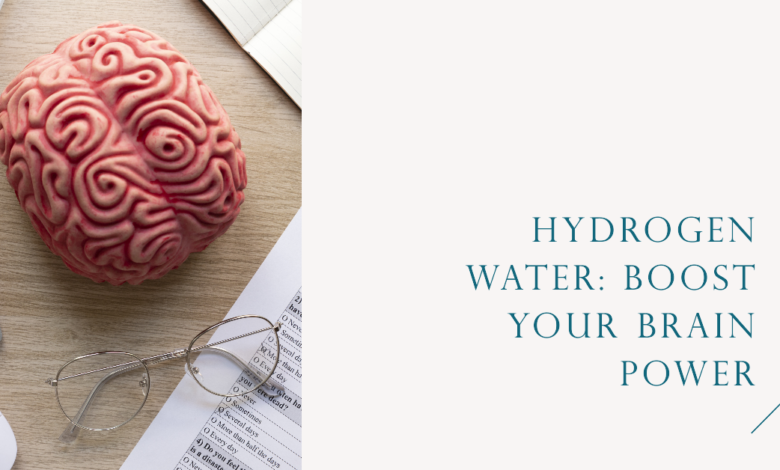Unlocking Brain Power: Can Hydrogen Water Enhance Cognitive Function?

People have tried many things to improve their cognitive function, ranging from food and exercise to supplements and the latest technologies. In this search, drinking hydrogen water is becoming more popular. Some people say it might help your brain work better. But does hydrogen water hold the key to making our minds smarter? This piece talks about the science behind hydrogen water and what people say about how it might affect the brain.
What Is Hydrogen Water?
Hydrogen water, which is also called hydrogen-rich water or hydrogen-infused water, is water that has molecular hydrogen (H2) dissolved in it. Molecular hydrogen is a gas that has no colour or smell and can protect cells from damage. It is thought to work by getting rid of dangerous free radicals in the body, which lowers oxidative stress and inflammation.
Under high pressure, molecular hydrogen gas is usually mixed with water to make hydrogen water. This is generally done with special tools. But magnesium and other metals can mix with water to make hydrogen water. Hydrogen gas is given off by this process.
The Promise Of Hydrogen Water For Cognitive Function:
Proponents of hydrogen water suggest that its antioxidant properties could benefit brain health and cognitive function in several ways:
Reducing Oxidative Stress:
Oxidative stress can happen when the body’s free radicals and antioxidants don’t work well together. This stress has been linked to Alzheimer’s disease, Parkinson’s disease, and other neurodegenerative diseases. Hydrogen water machine may help protect brain cells from toxic damage by getting rid of free radicals. This could keep the brain functioning.
Anti-Inflammatory Effects:
More and more people are realizing that chronic inflammation can lead to cognitive decline and neurodegenerative illnesses. Anti-inflammatory characteristics of molecular hydrogen may protect the brain from inflammation-induced damage and improve cognitive health.
Enhancing Blood Flow And Oxygen Delivery:
For optimal cognitive performance, the brain needs to get enough blood flow and oxygen. Some research suggests that hydrogen water may improve blood flow by promoting vasodilation, and the widening of blood vessels. By enhancing oxygen delivery to brain tissue, hydrogen water could potentially enhance cognitive performance and mental clarity.
Evaluating The Evidence:
While the theoretical rationale for hydrogen water’s cognitive benefits is compelling, the scientific evidence supporting its efficacy remains limited and somewhat preliminary. Several studies have looked at how hydrogen water affects brain function in both animal models and real people, with mixed results.
Animal Studies:
Some studies on animals have shown encouraging results, which suggest that hydrogen water may help protect neurons and improve brain function in different types of experiments. For example, a study published in the journal Neuroscience Letters found that hydrogen water supplementation attenuated cognitive decline and reduced oxidative stress in aged mice.
Also, a study in Medical Gas Research showed that giving rats hydrogen water improved their brain function and decreased neuroinflammation in a model of traumatic brain damage. These findings support the notion that hydrogen water could hold potential as a neuroprotective agent.
Human Studies:
In human studies, the evidence is less conclusive. While some clinical trials have reported positive effects of hydrogen water on cognitive function, others have failed to replicate these findings or have found only modest benefits.
For example, a randomized controlled study published in Nutritional Neuroscience looked at how hydrogen-rich water affected the brains of older people with mild cognitive impairment. The study found that people who drank hydrogen water every day for 12 weeks had much better brain function than people in a control group who drank regular water.
The Journal of Alzheimer’s Disease reported this. It said that hydrogen water showed promise in preclinical studies, but there wasn’t enough evidence to support its ability to improve cognitive function or slow the progression of Alzheimer’s disease in humans.
Conclusion:
Finally, hydrogen water may improve brain function, but more research is needed. Some studies on animals have shown promise, but studies on humans have had mixed results. This shows the need for bigger, better-designed clinical trials.
It is important to be skeptical of promises about hydrogen water and know that it is not a cure-all for brain diseases or cognitive decline. A balanced diet, regular exercise, and mental activity are all important parts of a healthy lifestyle that can help us keep our minds sharp as we age.
As research into hydrogen water and its effects on the brain continues to evolve, it will be essential to rigorously evaluate its safety, efficacy, and practicality as a potential adjunctive therapy for cognitive health. Until then, the quest to unlock our brain’s full potential remains an ongoing journey of exploration and discovery.






